中考初中英语语法八大时态总结(附答案)
初中英语语法八大时态总结(完整版)
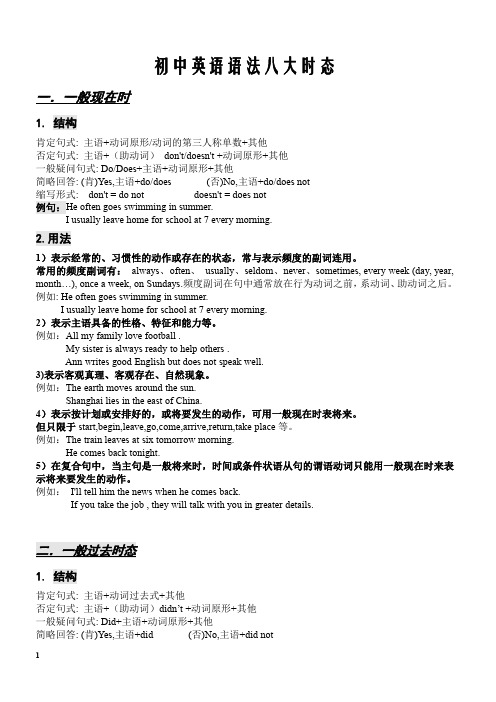
初中英语语法八大时态一.一般现在时1.结构肯定句式:主语+动词原形/动词的第三人称单数+其他否定句式:主语+(助动词)don't/doesn't+动词原形+其他一般疑问句式:Do/Does+主语+动词原形+其他简略回答:(肯)Yes,主语+do/does(否)No,主语+do/does not缩写形式:don't=do not doesn't=does not例句:He often goes swimming in summer.I usually leave home for school at7every morning.2.用法1)表示经常的、习惯性的动作或存在的状态,常与表示频度的副词连用。
常用的频度副词有:always、often、usually、seldom、never、sometimes,every week(day,year, month…),once a week,on Sundays.频度副词在句中通常放在行为动词之前,系动词、助动词之后。
例如:He often goes swimming in summer.I usually leave home for school at7every morning.2)表示主语具备的性格、特征和能力等。
例如:All my family love football.My sister is always ready to help others.Ann writes good English but does not speak well.3)表示客观真理、客观存在、自然现象。
例如:The earth moves around the sun.Shanghai lies in the east of China.4)表示按计划或安排好的,或将要发生的动作,可用一般现在时表将来。
但只限于start,begin,leave,go,come,arrive,return,take place等。
中考英语八种时态知识点归纳
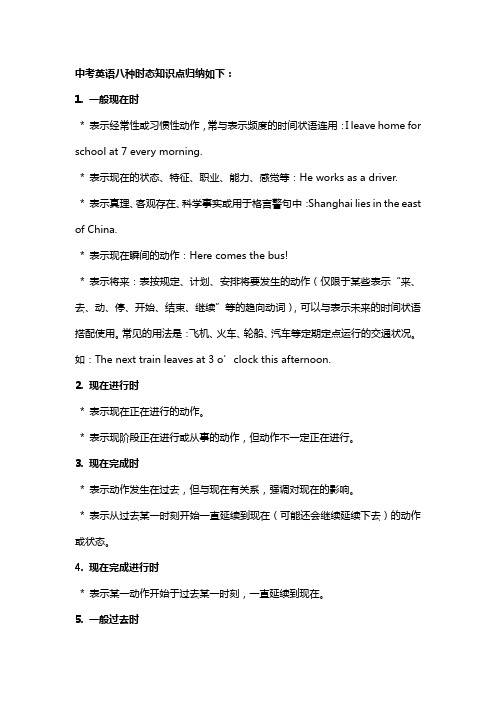
中考英语八种时态知识点归纳如下:1. 一般现在时* 表示经常性或习惯性动作,常与表示频度的时间状语连用:I leave home for school at 7 every morning.* 表示现在的状态、特征、职业、能力、感觉等:He works as a driver.* 表示真理、客观存在、科学事实或用于格言警句中:Shanghai lies in the east of China.* 表示现在瞬间的动作:Here comes the bus!* 表示将来:表按规定、计划、安排将要发生的动作(仅限于某些表示“来、去、动、停、开始、结束、继续”等的趋向动词),可以与表示未来的时间状语搭配使用。
常见的用法是:飞机、火车、轮船、汽车等定期定点运行的交通状况。
如:The next train leaves at 3 o’clock this afternoon.2. 现在进行时* 表示现在正在进行的动作。
* 表示现阶段正在进行或从事的动作,但动作不一定正在进行。
3. 现在完成时* 表示动作发生在过去,但与现在有关系,强调对现在的影响。
* 表示从过去某一时刻开始一直延续到现在(可能还会继续延续下去)的动作或状态。
4. 现在完成进行时* 表示某一动作开始于过去某一时刻,一直延续到现在。
5. 一般过去时* 表示过去某个时间发生的动作或存在的状态。
* 表示过去经常或反复发生的动作。
6. 过去进行时* 表示在过去某一时刻或某一段时间正在进行的动作。
7. 过去完成时* 表示在过去某一时刻之前已经完成或结束的动作或状态。
8. 一般将来时* 表示将来某个时间要发生的动作或存在的状态。
* 表示将来经常或反复发生的动作。
以上就是中考英语中常见的八种时态,希望对你有所帮助。
初中英语时态总结(八大时态精讲+习题+答案)[1]
![初中英语时态总结(八大时态精讲+习题+答案)[1]](https://img.taocdn.com/s3/m/450105136294dd88d1d26bcf.png)
初中英语八大时态全套精讲及练习题.1 一般现在时的用法1) 经常性或习惯性的动作,常与表示频度的时间状语连用。
时间状语:every…, sometimes,ofen,always,usually, twice a week, at…, on SundayI leave home for school at 7 every morning. He watches Tv once a week .2) 客观真理,客观存在,科学事实。
The earth moves around the sun.Shanghai lies in the east of China.3) 表示格言或警句中。
Pride goes before a fall.骄者必败。
注意:此用法如果出现在宾语从句中,即使主句是过去时,从句谓语也要用一般现在时。
例:Columbus proved that the earth is round..4) 现在时刻的状态、能力、性格、个性。
I don't want so much. Ann Wang writes good English but does not speak well.比较:Now I put the sugar in the cup.I am doing my homework now.第一句用一般现在时,用于操作演示或指导说明的示范性动作,表示言行的瞬间动作。
再如:Now watch me, I switch on the current and stand back. 第二句中的now是进行时的标志,表示正在进行的动作的客观状况,所以后句用一般现在时。
二. 构成及变化1、be动词的变化肯定句:主语+be(am,is,are)+其它。
如:I am a boy.我是一个男孩。
否定句:主语+ be + not +其它。
如:He is not a worker.他不是工人。
完整版初中英语八大时态总结精讲、习题、答案
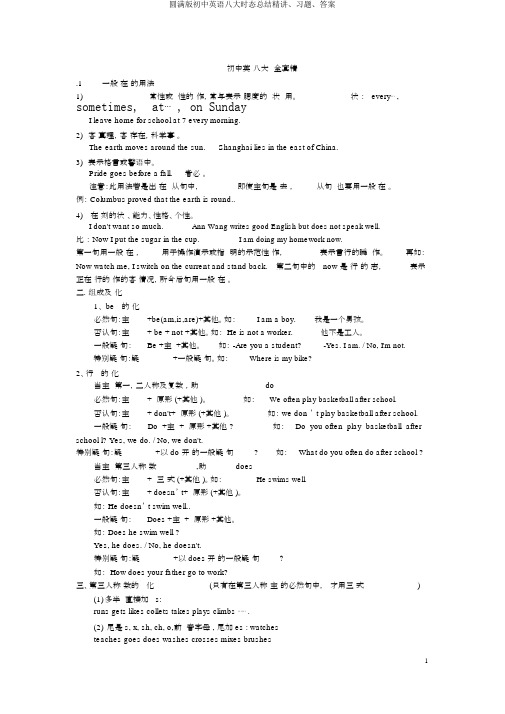
初中英八大全套精.1一般在的用法1)常性或性的作,常与表示腮度的状用。
状: every⋯ , sometimes, at⋯ , on SundayI leave home for school at 7 every morning.2)客真理,客存在,科学事。
The earth moves around the sun.Shanghai lies in the east of China.3)表示格言或警语中。
Pride goes before a fall.者必。
注意:此用法若是出在从句中,即使主句是去,从句也要用一般在。
例: Columbus proved that the earth is round..4)在刻的状、能力、性格、个性。
I don't want so much.Ann Wang writes good English but does not speak well.比: Now I put the sugar in the cup.I am doing my homework now.第一句用一般在,用于操作演示或指明的示范性作,表示言行的瞬作。
再如:Now watch me, I switch on the current and stand back.第二句中的now 是行的志,表示正在行的作的客情况,所今后句用一般在。
二. 组成及化1、 be 的化必然句:主+be(am,is,are)+其他。
如:I am a boy.我是一个男孩。
否认句:主+ be + not +其他。
如: He is not a worker.他不是工人。
一般疑句:Be +主 +其他。
如:-Are you a student?-Yes. I am. / No, I'm not.特别疑句:疑+一般疑句。
如:Where is my bike?2、行的化当主第一,二人称及复数,助do必然句:主+原形 (+其他 )。
中考初中英语语法八大时态总结(附答案)

中考初中英语语法八大时态总结(附答案)初中英语语法八大时态1.结构肯定句式: 主语+动词原形/动词的第三人称单数+其他否定句式: 主语+(助动词) don't/doesn't +动词原形+其他一般疑问句式: Do/Does+主语+动词原形+其他简略回答: (肯)Yes,主语+do/does (否)No,主语+do/does not缩写形式: don't = do not doesn't = does not例句:He often goes swimming in summer.I usually leave home for school at 7 every morning.2.用法1)表示经常的、习惯性的动作或存在的状态,常与表示频度的副词连用。
常用的频度副词有: always、often、 usually、seldom、never、sometimes, every week (day, year, month…), once a week, on Sundays.频度副词在句中通常放在行为动词之前,系动词、助动词之后。
例如: He often goes swimming in summer.I usually leave home for school at 7 every morning.2)表示主语具备的性格、特征和能力等。
例如:All my family love football .My sister is always ready to help others .Ann writes good English but does not speak well.3)表示客观真理、客观存在、自然现象。
例如:The earth moves around the sun.Shanghai lies in the east of China.4)表示按计划或安排好的,或将要发生的动作,可用一般现在时表将来。
中考初中八大时态总结归纳(精讲+总结+考点+练习+答案)
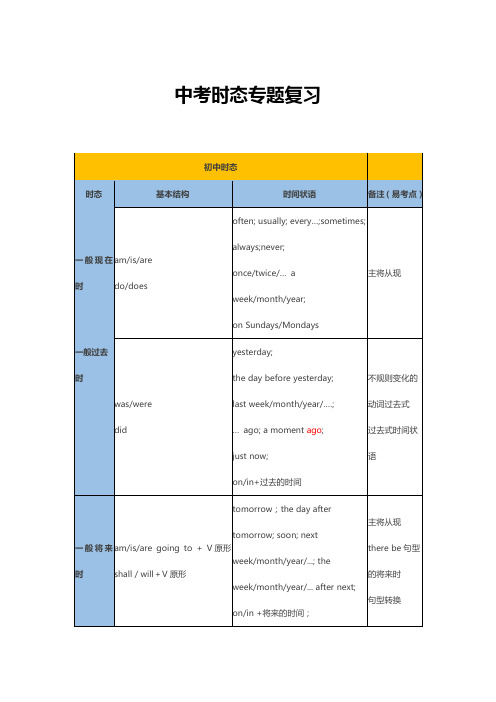
中考时态专题复习(一)一般现在时1.基本结构am/is/aredo/does2.句型:肯定:主+is/am/are 或者do/does否定:主+am/is/are+not 或者don’t/doesn’t +do 疑问:be动词+主…? 或者Do/Does+主…?3.用法经常习惯He often gets up at 6 in the morning.客观真理The moon goes round the earth.主将从现We will stay at home if it rains(二)一般过去时1.基本结构was/wereDid2.句型:肯定:主+was/were or did否定:主+wasn’t等or didn’t +do疑问:Was+主…?等or Did+主…?(三)一般将来时1.基本结构am/is/are going to + V原形shall/will+V原形2.句型:否定:主+be not going to +V原形/主+won’t+V原形疑问句:be+主+going to +V原形/will +主+V原形There be句型:There +am/is/are going to + beThere will be3.用法计划安排打算We’re going to hold a party next weekThey are going to be back tomorrow morning 根据迹象将要发生It’s going to rain outside进行时表将来V(come,go,start,begin,fly,arrive,stop,return) We are coming soon(四)过去将来时1.基本结构would+ V原形was/ were going to + V原形2.句型:否定: 主+would/should+do疑问: Had+主+done?(五)现在进行时1.基本结构am/ is/ are +V-ing2.句型:否定:主+is/am/are+ not + doing疑问:is/am/are + 主+ doing?3.用法正在进行We are having class now.现阶段发生He is writing a novel these days.反复性+强烈感情She is always helping others.(六)过去进行时1.基本结构:was/ were+ V-ing2.句型:主+ was/were(not) + doingWas/Were + 主+ doing?3.用法:过去正在发生We were cooking at this time yesterday.过去反复性+强烈感情Mum was always complaining.(七)现在完成时1.基本结构have/ has+done2.句型:否定:主+ haven’t/hasn’t+ done疑问:Have/Has + 主+ done?3.用法:过去发生对现在影响I have never read this book.过去发生持续至今We have lived in Xi’an for 10 years 判断:He has bought the car for 2 days.易考点:(1)瞬间动词与延续性动词borrow keepbuy havebecome bebegin/start be ondie be deadjoin be in/be member ofleave be awaycome be herego be therefinish be overleave be away fromget up be upmarry be married(2)Has been to /has gone to /has been in区分A:Is Mr.Wang at home?B:No,he is not in,he Beijing.My family Hongkong since 1998.He Shanghai three times.(八)过去完成时1.基本结构:had+ done2.句型:否定: 主+had+not+done疑问: Had+主+done?3.用法:过去的过去He had finished homework before we came.综合时态练习( )1. What _____ you _____ over the weekend?A. will; doB. does; doC. did; doD. were,; doing ( )2. Xiao Li usually _____ to school by bike last year.A. goesB. wentC. will goD. is going( )3. What _____ in our town 100 years from now?A. happenedB. is happenedC. has happenedD. will happen ( )4. Mr. Smith _____ to see you in an hour.A. cameB. has comeC. will comeD. comes( )5. _____ you _____ from your parents recently?A. Did; hearB. Have; heardC. Do; hearD. Will; hear ( )6. We _____ TV at home this time last night.A. were watchingB. watchedC. have watchedD. would watch( )7. We _____ over 1500 English words by the end of last month.A. have learnedB. had learnedC. will learnD. learnt( )8. She _____ in Shanghai for ten years since 1992.A. has livedB. had livedC. livedD. will live( )9. She _____ in Shanghai for ten years.A. has livedB. had livedC. livedD. will live( )10. We all know that the earth _____ round the sun.A. goesB. wentC. is goingD. will go( )11. “Where are the boys?”“They _____ soccer on the playground.”A. play B. are playing C. were playing D. played( )12. Look! Lucy _____ under the tree.A. readsB. is readingC. was readingD. read( )13. He _____ more than 200 model cars in the last five years.A. has collectedB. had collectedC. collectedD. will collect( )14. Jim _____ a letter to his parents at 7:30 last night.A. had writtenB. wroteC. would writeD. was writing( )15. The Smiths _____ in Beijing since two weeks ago.A. stayedB. were stayingC. would stayD. have stayed( )16. “When _____ you _____ the bike?”“Last Monday.”A. have; boughtB. did; buyC. will; buyD. do; buy( )17. Look! The boy _____English now.A. likesB. likedC. is likingD. was liking( )18. Most students in our class _____ TV twice a week.A. watchB. watchedC. will watchD. are watching( )19. How soon _____ they _____ back from work?A. do; comeB. did; comeC. have; comeD. will; come( )20. “Where _____ you _____ Mr. Li?”“In his office, half an hour ago.”A. will; see B. did; see C. have, seen D. do; see( )21. I _____ a new dictionary. Look! It’s very useful.A. boughtB. will buyC. have boughtD. would buy ( )22. I won’t watch the movie tonight. I _____ it before.A. will seeB. have seenC. sawD. had seen( )23. Hello! I _____ know you _____ in Chengdu. How long have you been here?A. didn’t; wereB. don’t areC. didn’t; areD. don’t; were ( )24. He _____ a fire and then cooked a meal.A. had madeB. was makingC. madeD. has made( )25. If I _____ time tomorrow, I will go to visit my grandfather.A. haveB. will haveC. would haveD. am having( )26. I’m going to be a doctor when I _____ up.A. growB. will growC. grewD. am growing( )27. The film _____ on for five minutes when I got to the cinema.A. has beenB. had beenC. wasD. is( )28. She _____ dinner when her son came in.A. has cookedB. had cookedC. was cookingD. would cook( )29. The train _____ when we got to the station. We had to wait for the next one.A. has leftB. had leftC. leftD. was leaving( )30. He said that he _____ to the barber’s tomorrow morning.A. will goB. wentC. is goingD. would go( )31. In the last years I _____ a lot of friends.A. have madeB. madeC. will makeD. was making ( )32. The boys _____ for about two hours.A. are playing soccerB. have been playing soccerC. were playingD. play soccer( )33. He _____ so quickly that he could win the race.A. is runningB. will runC. ranD. had run( )34. He didn’t go there with us because he _____ there before.A. has beenB. had beenC. wentD. would go( )35. I don’t know if he ______ tomorrow. If he _____, I will tell you.A. will come; will comeB. comes; comesC. will come; comesD. comes; will come( )36. When I was young, my mother told me that the sun _____ in the east.A. riseB. risesC. roseD. had risen( )37. “_____ you _____ your work?”“Yes. I finished it an hour ago.”A. Did; finish B. Have; finished C. Will; finish D. Had; finished( )38. Hurry up, or you _____ the early bus.A. will missB. has missedC. would missD. missed ( )39. I _____ Mr. Green while I _____ along the street last Sunday.A. met; walkedB. was meeting; walkedC. met; was walkingD. was meeting; was walking( )40. Tom is strong and he _____ to school every day.A. walkedB. walksC. will walkD. has walked( )41. He said that he _____ with Mr. Black at that time.A. talkedB. was talkingC. is talkingD. would talk( )42. We _____ English in this school since we came here.A. have studiedB. studiedC. had studiedD. were studying ( )43. She _____ at home until her mother came back.A. has stayedB. stayedC. had stayedD. will stay ( )44. There will be an interesting movie _____ two days.A. forB. inC. afterD. since( )45. She _____ there until I came back.A. didn’t leaveB. has stayedC. leftD. was staying( )46. It has been raining _____ two hours ago.A. untilB. forC. sinceD. by( )47. His father _____ since he was two years old.A. has diedB. diedC. has deathD. has been dead ( )48. The meeting _____ for ten minutes when I got there yesterday. A. has begun B. had begun C. has been on D. had been on ( )49. He had collected over 500 stamps _____ he was twelve years old.A. sinceB. forC. untilD. by the time( )50. I was doing my homework _____ she rang me up last night.A. whenB. whileC. sinceD. before( )51. “Where is John?”“He _____ the library.”A. has been toB. has gone toC. has been inD. has been at ( )52. How long _____ you _____ the computer?A. have; boughtB. did; buyC. have ; hadD. will; buy( )53. She _____ Shanghai for two days.A. leftB. has leftC. will leaveD. has been away from ( )54. He didn’t tell me anything about it _____ he left.A. sinceB. untilC. by the timeD. while( )55. She _____ China since she was five years old.A. has come toB. has arrived atC. has arrived inD. has been in( )56. I had finished my homework _____ I watched TV last night.A. beforeB. afterC. whenD. until( )57. Miss White has been _____ the music club for 4 years.A. joiningB. joinC. joinedD. in( )58. What do you think he will _____ ten years?A. be forB. be atC. be toD. be in( )59. There _____ two football games in our school next week.A. is going to beB. will haveC. will beD. is going to have ( )60. They _____ a birthday party next Friday afternoon.A. is going to beB. will beC. will haveD. is going to have ( )61. How long have you ____ the pen?A. keptB. boughtC. borrowedD. got( )62. I _____ Mr. Brown since I left Shanghai in 2004.A. have seenB. sawC. haven’t seenD. didn’t see( )63. You don’t have to describe her. I _____ her several times.A. had metB. have metC. metD. meet( )64. I _____ a cold for five days. I still can’t get rid of it.A. caughtB. hadC. have caughtD. have had( )65. What _____ you _____ at nine o’clock that morning?A. are; doingB. did; doC. were; doingD. had; done( )66. What _____ you _____ by nine o’clock that morning?A. are; doingB. did; doC. were; doingD. had; done( )67. The sign _____, “No Parking!”A. readsB. was readC. is readingD. read( )68. “_____ you _____ your lunch?”“Yes. I _____ it at school.”A. Did; have; have hadB. Have; had; hadC. Did; have; hadD. Have; had; have( )69. Lily _____ for her mother until she _____ home.A. will wait; will comeB. won’t wait; comesC. will wait; comesD. waits; will come( )70. “Mr. Brown is leaving for a trip.”“Really? Where _____ he _____?”A. has; gone B. will; go C. did; go D. does; go( )71. Tom, you _____ the book for two weeks. You have to return it now.A. borrowedB. have borrowedC. keptD. have kept( )72. “Have you mended your shoes?”“Yes. I _____ it twenty minutes ago.”A. have mendedB. mendedC. had mendedD. will mend( )73. Mr. Smith _____ to China last year and _____ in love with her.A. goes; fallsB. went; fellC. went; feltD. has gone; fell( )74. If you don’t go to the meeting tomorrow, _____.A. he will, tooB. he won’t, eitherC. he does, tooD. he doesn’t, either ( )75. “Shall we go watching the match?”“Sorry, I can’t. I _____ my homework.”A. doB. have doneC. am doingD. did( )76. The children won’t go hiking if it _____ next Sunday.A. rainB. rainsC. will rainD. is raining( )77. “_____ you _____ to Japan?”“Yes. I will go there next month.”A. Have; beenB. Have; goneC. Are; goingD. Did; go( )78. When I got there, the film _____ for five minutes.A. had been onB. had begunC. was beginningD. began( )79. Don’t open the door until the bus _____.A. will stopB. doesn’t stopC. is stoppingD. stops( )80. “_____ you _____ to Japan?”“Yes. We went there last year.”A. Have; beenB. Have; goneC. Did; goD. Are; going参考答案:1-5 CBDCB 6-10 ABBAA 11-15 BBADD 16-20 BAADB 21-25 CBACA 26-30 ABCBD 31-35 ABCBC 36-40 BBACB 41-45 BABBA 46-50 CDDDA 51-55 BCDBD 56-60 ADDCC 61-65 ACBDC 66-70 DABCB 71-75 BBBBC 76-80 BCADA。
(中考英语资料)初中英语语法八大时态总结(完整版)含答案
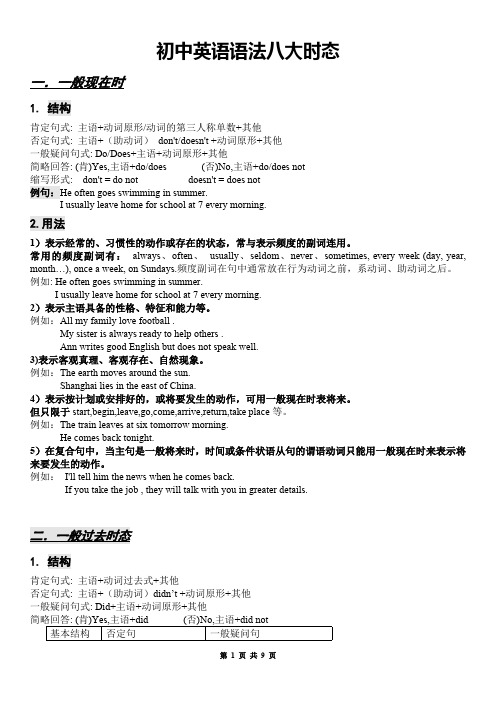
初中英语语法八大时态一.一般现在时1. 结构肯定句式: 主语+动词原形/动词的第三人称单数+其他否定句式: 主语+(助动词)don't/doesn't +动词原形+其他一般疑问句式: Do/Does+主语+动词原形+其他简略回答: (肯)Yes,主语+do/does (否)No,主语+do/does not缩写形式: don't = do not doesn't = does not例句:He often goes swimming in summer.I usually leave home for school at 7 every morning.2.用法1)表示经常的、习惯性的动作或存在的状态,常与表示频度的副词连用。
常用的频度副词有:always、often、usually、seldom、never、sometimes, every week (day, year, month…), once a week, on Sundays.频度副词在句中通常放在行为动词之前,系动词、助动词之后。
例如: He often goes swimming in summer.I usually leave home for school at 7 every morning.2)表示主语具备的性格、特征和能力等。
例如:All my family love football .My sister is always ready to help others .Ann writes good English but does not speak well.3)表示客观真理、客观存在、自然现象。
例如:The earth moves around the sun. Shanghai lies in the east of China.4)表示按计划或安排好的,或将要发生的动作,可用一般现在时表将来。
初中英语语法八大时态总结
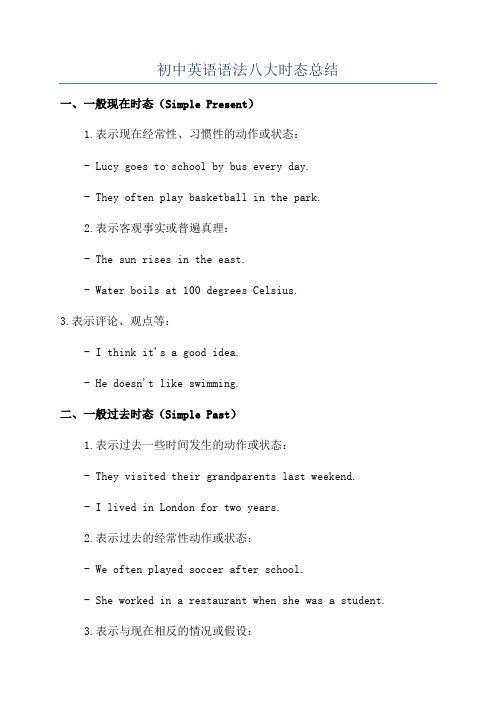
初中英语语法八大时态总结一、一般现在时态(Simple Present)1.表示现在经常性、习惯性的动作或状态:- Lucy goes to school by bus every day.- They often play basketball in the park.2.表示客观事实或普遍真理:- The sun rises in the east.- Water boils at 100 degrees Celsius.3.表示评论、观点等:- I think it's a good idea.- He doesn't like swimming.二、一般过去时态(Simple Past)1.表示过去一些时间发生的动作或状态:- They visited their grandparents last weekend.- I lived in London for two years.2.表示过去的经常性动作或状态:- We often played soccer after school.- She worked in a restaurant when she was a student.3.表示与现在相反的情况或假设:- If I had money, I would buy a new car.- I wish I could go to the concert with you.三、一般将来时态(Simple Future)1.表示将来要发生的事情:- I will meet him at the airport tomorrow.- They are going to have a party next week.2.表示意愿、打算或承诺:- I promise I will help you.- She is going to study abroad next year.四、现在进行时态(Present Continuous)1.表示现在正在进行或暂时的动作:- They are playing football in the park.- He is studying for the exam.2.表示现阶段的变化或趋势:- The population of the city is increasing rapidly.- More and more people are using smartphones.五、过去进行时态(Past Continuous)1.表示过去一些时间正在进行中的动作:- I was watching TV when she called me.- They were having dinner when the power went out.2.表示过去一些时间同时发生的两个动作:- While he was reading, his sister was playing the piano.- When I arrived, they were still waiting for you.六、将来进行时态(Future Continuous)1.表示将来一些时间正在进行的动作:- He will be sleeping when you arrive.2.表示将来一些时间同时发生的两个动作:- While you are washing the dishes, I will be cleaning the bathroom.- When I call you, she will be cooking dinner.七、现在完成时态(Present Perfect)1.表示过去发生但对现在有影响的动作或状态:- I have lost my key, so I can't open the door.- She has finished her homework, so she can watch TV now.2.表示经历或遭遇过的事情:- Have you ever been to Paris?- He has never seen such a beautiful sunset.八、过去完成时态(Past Perfect)1.表示在过去一些时间之前已经发生的动作或状态:- When I arrived, they had already left.2.表示过去一些时间之前一直存在或保持的状态:- He had lived in that house for 10 years before he moved out.- She had been planning the party for weeks.。
- 1、下载文档前请自行甄别文档内容的完整性,平台不提供额外的编辑、内容补充、找答案等附加服务。
- 2、"仅部分预览"的文档,不可在线预览部分如存在完整性等问题,可反馈申请退款(可完整预览的文档不适用该条件!)。
- 3、如文档侵犯您的权益,请联系客服反馈,我们会尽快为您处理(人工客服工作时间:9:00-18:30)。
中考初中英语语法八大时态总结(附答案)初中英语语法八大时态1.结构肯定句式: 主语+动词原形/动词的第三人称单数+其他否定句式: 主语+(助动词) don't/doesn't +动词原形+其他一般疑问句式: Do/Does+主语+动词原形+其他简略回答: (肯)Yes,主语+do/does (否)No,主语+do/does not缩写形式: don't = do not doesn't = does not例句:He often goes swimming in summer.I usually leave home for school at 7 every morning.2.用法1)表示经常的、习惯性的动作或存在的状态,常与表示频度的副词连用。
常用的频度副词有: always、often、 usually、seldom、never、sometimes, every week (day, year, month…), once a week, on Sundays.频度副词在句中通常放在行为动词之前,系动词、助动词之后。
例如: He often goes swimming in summer.I usually leave home for school at 7 every morning.2)表示主语具备的性格、特征和能力等。
例如:All my family love football .My sister is always ready to help others .Ann writes good English but does not speak well.3)表示客观真理、客观存在、自然现象。
例如:The earth moves around the sun.Shanghai lies in the east of China.4)表示按计划或安排好的,或将要发生的动作,可用一般现在时表将来。
但只限于start,begin,leave,go,come,arrive,return,take place等。
例如:The train leaves at six tomorrow morning.He comes back tonight.5)在复合句中,当主句是一般将来时,时间或条件状语从句的谓语动词只能用一般现在时来表示将来要发生的动作。
例如: I'll tell him the news when he comes back.If you take the job , they will talk with you in greater details.1.结构肯定句式: 主语+动词过去式+其他否定句式: 主语+(助动词)didn’t +动词原形+其他一般疑问句式: Did+主语+动词原形+其他简略回答: (肯)Yes,主语+did (否)No,主语+did not1)表示过去某一时刻或某一段时间里所发生的动作或情况。
常和表示过去的时间状语yesterday, just now, the other day, in 1982, ago, an hour ago, long long ago, the day before yesterday, last week(year, night, month…), at the age of 5, one day, once upon a time等连用例如:Where did you go just now?After a few years, she started to play the piano.2)表示在过去,经常或反复发生的动作。
常与often,always等表示频度的副词连用。
例如:When I was a child, I often played football in the street.我是个孩子的时候,常在马路上踢足球。
3)一般过去式也可与today,this week,this month,this year等表现在的时间状语连用,但这些时间状语须指过去的时间,决不包含“现在”“此时此刻”的意思。
例如:Did you see him today?今天你看见他了吗?1.结构结构1:肯定句式:主语+助动词will+动词原形+其他否定句式:主语+助动词will+动词原形+not+其他一般疑问句式:助动词Will+主语+动词原形+其他简单回答:在口语中,will在名词或代词后常缩为’ll,wii not常简缩为won’t。
在疑问句中,主语为第一人称时(I和we)时,常用助动词shall。
例如:She’ll go to play basketball.Shall we go to the zoo?结构2:肯定句式:主语+be going to +动词原形+其他否定句式:主语+be not going to +动词原形+其他一般疑问句式:Be+主语+going to+动词原形+其他简略回答:(肯)Yes,主语+be (否)No,主语+be not2.用法1)表示将来某个时间要发生的动作或存在的状态,常与tomorrow, next day(week, month, year…), soon, in a few minutes, by…, the day after tomorrow等连用。
例如:I'll meet you at the school gate tomorrow morning.2)、表示说话人对于将来的看法、假设和推测,通常用于be afraid, be/feel sure, hope, know, think等后面的从句或与副词perhaps,possibly,maybe等连用。
例如:I think she’ll go back home for supper.Maybe she’ll go to the gym.将来时其他表示法1)be going to表示将来表示说话人的打算、计划、安排或根据迹象判断必然或很可能发生的事情。
例如:What are you going to do tomorrow?The play is going to be produced next month。
注意:be going to 和will之间的区别。
在时间上:be going to通常表示马上要发生或相当快就要发生的事情;而will不指明任何具体时间,可以指遥远的未来。
He is going to be better.He will be better.计划/临时:两者都表示意图时,be going to含有预先计划、准备的意思;will则指未经过预先思考或计划,是临时的一种决定。
— What are you going to do next Sunday?— I'm going to go fishing.— Where is the telephone book?— I'll go and get it for you.两者都用于预测时,be going to意指有迹象表明某件事将要发生,属客观的推测;will则意指说话人认为/相信某件事将要发生,属主观的推测。
在条件状语从句中,be going to表将来,will表意愿。
例如:If you are going to make a journey, you'd better get ready for it as soon as possible.Miss Gao will tell you the answer if you ask her.2)“be to+动词原形”表示客观安排或受人指示而将要做某事。
例如:We are to discuss the report next Saturday.3)be about to +动词原形,意为马上做某事。
不能与tomorrow, next week 等表示明确将来时的时间状语连用,多于when引导的时间状语连用。
例如:He is about to leave for Beijing.1.结构:am/is/are+动词的现在分词2.用法:1)表示现在(指说话人说话时)正在发生或进行的动作。
常与now, right now, at this moment, at this time, these days等时间状语连用。
注:如果句首有警示性动词look、listen 等,主句的动词也与现在进行时连用。
例如:We are waiting for you now.Listen! The bird is singing in the tree.2).表示现阶段(说话前后一段时间内),一直在进行的活动。
说话时动作未必正在进行。
例如:Mr. Green is writing another novel.他在写另一部小说。
(说话时并未在写,只处于写作的状态。
)He is thinking about this problem.这些天来他一直在考虑这个问题。
3).表示反复发生的动作或持续存在的状态,常与always, constantly, forever 等词连用,往往带有说话人的主观色彩。
例如:You are always changing your mind.4).表示尚未完成的渐变过程,这样的动词有:get, grow, become, turn, run, go, begin等。
例如:The leaves are turning red.It's getting warmer and warmer.5)、表示移位的动词,如go,come,leave,start,arrive等,其现在进行时可表将来。
例如:I'm leaving tomorrow. 明天我要走了。
The train is arriving soon. 火车要到了。
注:不能用进行时态的动词1.结构:肯定句:主语+助动词have(has)+动词过去分词-ed否定句:主语+助动词have(has)+not(haven’t,hasn’t)+动词过去分词-ed一般疑问句:Have(Has)+ 主语+动词过去分词-ed+?特殊疑问句:疑问词+have(has)+ 主语+动词过去分词-ed+?2.用法含义:现在完成时用来表示现在之前已发生或完成的动作或状态,但其结果却和现在有联系, 也就是说, 动作或状态发生在过去但它的影响现在还存在。
1)现在完成时往往同表示不确定的过去时间状语连用, 如already, yet, just, before, recently,lately等Mr. Wang has just come back from America. 王先生刚从美国回来。
